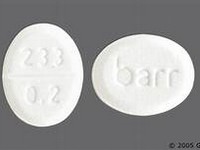Tizanidine

CLINICAL USE
Spasticity associated with multiple sclerosis or spinal cord injury/diseaseDOSE IN NORMAL RENAL FUNCTION
2–24 mg daily in up to 3–4 divided doses (depending on response)PHARMACOKINETICS
DOSE IN RENAL IMPAIRMENT
GFR (mL/MIN)
25–50 Dose as in normal renal function <25 Initial dose 2 mg once daily and slowly increase by 2 mg increments. Increase daily dose before increasing frequency of administrationDOSE IN PATIENTS UNDERGOING RENAL REPLACEMENT THERAPIES
IMPORTANT DRUG INTERACTIONS
Potentially hazardous interactions with other drugsADMINISTRATION
Reconstition
–Route
OralRate of Administration
–Comments
–OTHER INFORMATION
Pharmacokinetic data suggest that renal clearance in the elderly may be decreased by up to 3-fold May induce hypotension; therefore may potentiate the effect of antihypertensive drugs, including diuretics – exercise caution With beta-blockers or digoxin, may potentiate hypotension or bradycardia LFTs should be monitored monthly for the first 4 months Tizanidine undergoes rapid and extensive first pass metabolism. The metabolites (mainly inactive) constitute 70% of the administered dose and are excreted via the renal route
See how to identify renal failure stages according to GFR calculation
See how to diagnose irreversible renal disease
Home








